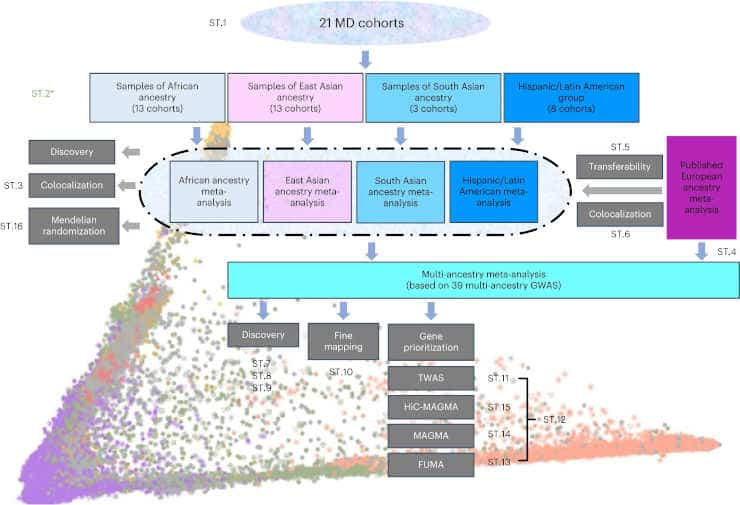In the first large-scale global study of the genetics of major depression in participants of diverse ancestry groups, researchers discovered more than 50 new genetic loci (a locus is a specific position on a chromosome) and 205 novel genes associated with depression.
The study also demonstrates the potential for drug repurposing, as NDUFAF3 – one of the identified genes – encodes a protein that is targeted by a common diabetes drug, as well as pointing to new targets for drugs that may be developed to treat depression.
Depression is fairly frequent, but how it develops is yet unknown. Big data genetic research opens up new paths for understanding the disease, revealing scores of genes linked to depression, each of which provides only a minor increase in risk.
Multi-ancestry Gene Research

Genetic research can also aid in the discovery of new drug targets, but so far, research has primarily focused on people of European ancestry, which the researchers believe is a major shortcoming, particularly for a complex condition like depression.
Multiple genetic research approaches were used in the current publication, including genome-wide association studies, a meta-analysis of previously published data, and a transcriptome-wide association study.
The worldwide research team examined genetic data from 21 study cohorts from various nations, encompassing approximately one million persons of African, East Asian, South Asian, and Hispanic/Latin American heritage, including 88,316 people with serious depression.
The study made big steps forward in finding genes linked to depression, both by finding new links and strengthening links that were already known. It also brought to light some genes that might have effects on drug development.
Metformin and Depression
The protein NDUFAF3 encodes for NADH dehydrogenase [ubiquinone] 1 alpha subcomplex assembly factor 3 has been linked to mood instability in the past, and metformin, the main drug used to treat type 2 diabetes, targets it. Metformin has been linked to reduced depression and anxiety in animal studies, therefore this current study implies that more research into metformin and depression is warranted.
Researchers also found other genes that may be biologically linked to depression. These include a gene related to a neurotransmitter that helps people behave in a goal-directed way and genes that code for a type of protein that has been linked to a number of neurological conditions in the past.
Surprisingly, the researchers found less overlap in the genetic hits for depression across ancestry groups than expected, at about 30% (based on a new method developed by the research team to gauge the degree to which a genetic association found in one ancestry group is applicable to another ancestry group), which is less overlap than previously found for other traits and diseases.
Genetic Data Diversity is Critical
The results suggest it is even more important to study depression in diverse samples because some of the findings might be ancestry-specific.
“Here we show beyond doubt that our understanding of such complex diseases as depression will remain incomplete until we overcome the Eurocentric bias in genetics research and look for causes in diverse people across the world,”
said lead author Professor Karoline Kuchenbaecker of University College London Psychiatry and UCL Genetics Institute.
Many genes previously linked to depression risk may only affect depression risk in people of European ancestry, so it is critical that genetic datasets are sufficiently diverse in order for genetic research to contribute to new drugs that can help people of all ancestries.
“This is a first-stage discovery effort, so more work will be needed to confirm these new targets, but finding them in the first place has been a huge and vital challenge, especially for a disorder where new medications are so urgently needed,”
Professor Kuchenbaecker added.
Limitations
The authors acknowledge some limitations with the study.
They classified people based on their ancestry and ethnicity. While this provided crucial insights, such categorical designations are imperfect, and certain admixed ancestors may still be eliminated. In future studies, the team hopes to use a variety of analytic methodologies that are all-inclusive.
The sample size differed substantially between ancestry groups. Individuals of South Asian heritage made up the smallest group. The majority of the people in the survey are from the United States or the United Kingdom. Future studies that prioritize primary data collecting are required to describe Major Depression in global populations.
To obtain large sample sizes, the work used data from many existing cohorts and bioresources. This demanded the use of various outcome definitions, which included self-administered symptom questionnaires, electronic healthcare records, and organized clinician interviews. Some of the 190 genome-wide significant loci revealed may be linked to a more general predisposition to mental disease rather than being unique to depression.
Abstract
Most genome-wide association studies (GWAS) of major depression (MD) have been conducted in samples of European ancestry. Here we report a multi-ancestry GWAS of MD, adding data from 21 cohorts with 88,316 MD cases and 902,757 controls to previously reported data. This analysis used a range of measures to define MD and included samples of African (36% of effective sample size), East Asian (26%) and South Asian (6%) ancestry and Hispanic/Latin American participants (32%). The multi-ancestry GWAS identified 53 significantly associated novel loci. For loci from GWAS in European ancestry samples, fewer than expected were transferable to other ancestry groups. Fine mapping benefited from additional sample diversity. A transcriptome-wide association study identified 205 significantly associated novel genes. These findings suggest that, for MD, increasing ancestral and global diversity in genetic studies may be particularly important to ensure discovery of core genes and inform about transferability of findings.
Reference:
- Meng, X., Navoly, G., Giannakopoulou, O. et al. Multi-ancestry genome-wide association study of major depression aids locus discovery, fine mapping, gene prioritization and causal inference. Nat Genet (2024). Doi: 10.1038/s41588-023-01596-4
